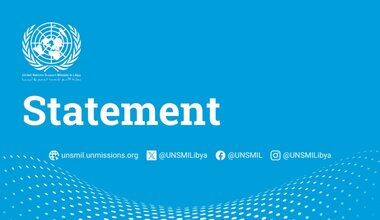Remarks by Assistant Secretary-General- Resident and Humanitarian Coordinator, Georgette Gagnon for the National Youth Conference - 27 November – Tripoli
Excellency President of the Presidency Council, Dr. Mohamed Almenfi
Excellencies,
Libyan Youth,
Colleagues,
Good afternoon
It is a great pleasure to be here today, representing the United Nations in Libya.
We are thrilled to see this diverse, energetic crowd of young women and men from across Libya’s social and political spectrums, coming together under one roof to talk about peace, reconciliation, and the future.
Six years ago, the United Nations Security Council adopted the ground-breaking resolution 2250 (2015) on Youth, Peace, and Security which recognizes that “young people play an important and positive role in the maintenance and promotion of international peace and security”.
This resolution and two others stress the critical importance of young peoples’ participation and leadership in peace and security efforts and urge all UN member states – including Libya - to amplify the voices of youth in decision-making and peace processes and to recognize their vital role in building and sustaining peace.
Youth, women and men alike, are the future here and everywhere.
You are the ones who can and will contribute to the peaceful and prosperous development of a better future for Libya.
Here I quote the UN Secretary-General “All of our hopes for a better world rest on young people. Sustainable development, human rights, and peace and security can only be achieved if we empower young people as leaders and enable them to unleash their full potential.”
We, at the United Nations, guided by the relevant UN Security Council resolutions and the UN’s Youth 2030 Strategy are mandated and committed to working with and empowering youth, engaging and listening to young people's priorities and needs, and supporting young peoples’ real participation in decision-making and leadership in shaping the future of their countries.
Two days ago, with the UN Special Envoy, we met with representatives of the Libyan Youth Forum. We listened with appreciation and admiration to their briefing about efforts to mobilize Libyan youth from all regions and all political and cultural backgrounds, to lead bottom-up community-based national reconciliation, and to ensure the effective participation of youth in the political life of Libya, particularly in the upcoming elections.
On 24 November, the UN Security Council in a Presidential Statement on Libya stressed the need to hold Parliamentary and Presidential elections on 24 December 2021 as set out in the political roadmap and UN Security Council resolution 2570 (2021).
The Security Council also stressed the importance of free and fair Presidential and Parliamentary elections that are inclusive and credible and underlined the importance of arrangements to ensure the full, equal and meaningful participation of women and the inclusion of youth.
As such, we call on all young women and men across the country to actively participate in these elections, to seize this unique opportunity, through voting and engaging as candidates, to elect your true representatives and re-shape the political class of your country.
Your engagement in political life as a critical catalyst and force of change can transform the political environment and culture, and contribute to putting Libya further on the path of democracy, stability, unity, and prosperity.
During my recent visits to entrepreneurship and livelihood programmes in Tripoli and Benghazi where the UN, private sector, and civil society are investing in partnerships with youth as agents of change, I spoke to young Libyans who are already on the frontline of change - leading the use of new technology to network, create and speak out for change.
Youth are also a critical line of defence, and important agents of change, in the fight against hate speech and incitement to violence (particularly online and around elections) as they are the most affected by this epidemic.
We, at the UN, are here to listen to the voices of young people, to invest in young people, and to promote and support the involvement of young women and men meaningfully in all decision-making that affects their lives.
We wish you again a great conference and we look forward to hearing about the outcomes of your discussions today.
Thank you
 United Nations Peacekeeping
United Nations Peacekeeping UN
UN









